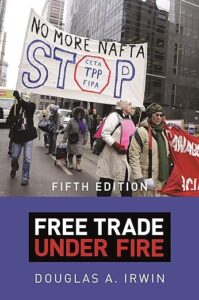Is Protectionism a Dead Letter?

Short version: Not quite, but it’s getting there.
Starting in 2016, protectionism (that is, using tariffs or other restrictions on international trade to “protect” domestic industries) came back in vogue. This trend was supercharged during the COVID-19 pandemic as lockdowns and price controls led to shortages of many goods. Protectionists pointed to these shortages as proof that globalization has weakened supply chains and protectionism is thus needed. Elsewhere, I have argued why this claim is incorrect empirically and theoretically (Part 1 and Part 2). Here, I want to do a different exploration.
While economists almost unanimously argue that free trade is a 1st-best option and that any protectionist measures are exceptions rather than rules, protectionists tend to claim the opposite. They will often argue that free trade weakens domestic firms, makes one vulnerable to supply chain disruptions, and potentially slaves to the whims of trading partners. In an extreme sense, some protectionists even argue that free trade constitutes the reduction or removal of sovereignty of a country. Thus, protectionism is the 1st-best (ideally autarky) and a nation should only trade for goods it cannot produce domestically.
For the purposes of this post, I will take the protectionist argument as correct (to be clear, the evidence is overwhelming that the protectionist position is incorrect. But, for the sake of argument, we are taking it correct). Thus, ab initio, protectionism is preferable to free trade.
Rarely, however, are we in an initial state. We are not at time point T0 but rather time point Tn. Consequently, we need to consider the current state of the world rather than some idealized state-of-nature starting point. We need to take into account current arrangements, laws, customs, attitudes, etc. Under this framework, what is ideal ab initio may not be ideal or even improving currently.
For example, I am reminded of the frequent pseudo-noir narrative trope: “It was 5PM on a Friday night and I already had three shots in me: two were Jack and one was an old .38 slug the doc never fished out.” The ideal number of bullets in one’s body is 0. However, after one has been shot, it may not always be ideal or wise to remove the bullet. Removing it could do more harm than good.
To keep the analogy going, given our assumptions, free trade is like getting shot: it’s not ideal. But, in 2016, the world had already been “shot.” Since the end of World War 2, international trade has become increasingly significant around the world. Vertical specialization has become a vital part of international trade. Vertical specialization is where different inputs (intermediate goods) are produced all over the world and assembled in one spot. For example, an iPhone may be “made in China,” but that is just the final assembly. It has parts from Germany, Taiwan, the US, and all over the world.

Indeed, Dartmouth economist Doug Irwin reports estimates that about half of the US growth in trade since the 60s, and 1/3rd of the world growth in trade since the 70s, is due to vertical specialization (Free Trade Under Fire, 5th edition, page 18n10).
Protectionists point to this vertical specialization as the problem and aim to “remove” that particular “bullet” from the “body.” But has that worked? Numerous studies have shown that, no, protectionism has caused more harm than good. Just some evidence: Amiti et al estimate that the tariffs imposed by Trump have reduced net American income by about $1.4 billion per month since going into effect. IBIS World Reports report that US iron and steel manufacturing employment is down by about 0.5% since the steel tariffs went into effect. The same company estimates washer and dryer manufacturing employment is down 4.2%. The US trade deficit continued to increase. In short, the protectionist policies made the country worse off and didn’t accomplish their stated goals (for a fuller survey of the evidence, see Chapter 2 of the aforementioned Free Trade Under Fire. It’s approximately 50 pages of studies finding protectionism harms economic growth).
Back to my original question: is protectionism a dead letter? In many cases: yes, it is. By its own goals, protectionism has failed. The window seems to have slammed shut on protectionism. Looking at the world as it currently is as opposed to some idealized state-of-nature, protectionism is causing harm. But, for reasons Edwin van de Haar discusses in his excellent 2023 book Human Nature & World Affairs: An Introduction to Classical Liberalism and International Relations Theory, I am not willing to shut the door on protectionism for national defense reasons. That justification still needs to be treated carefully for reasons I discussed in a still-relevant 2018 EconLib article, but it seems to be the only case currently where protectionism can potentially be good (for a particularly silly example of national defense justification gone too far, check out Sen. Rick Scott’s call for garlic to be tariffed on national defense grounds).
Jon Murphy is an assistant professor of economics at Nicholls State University.
